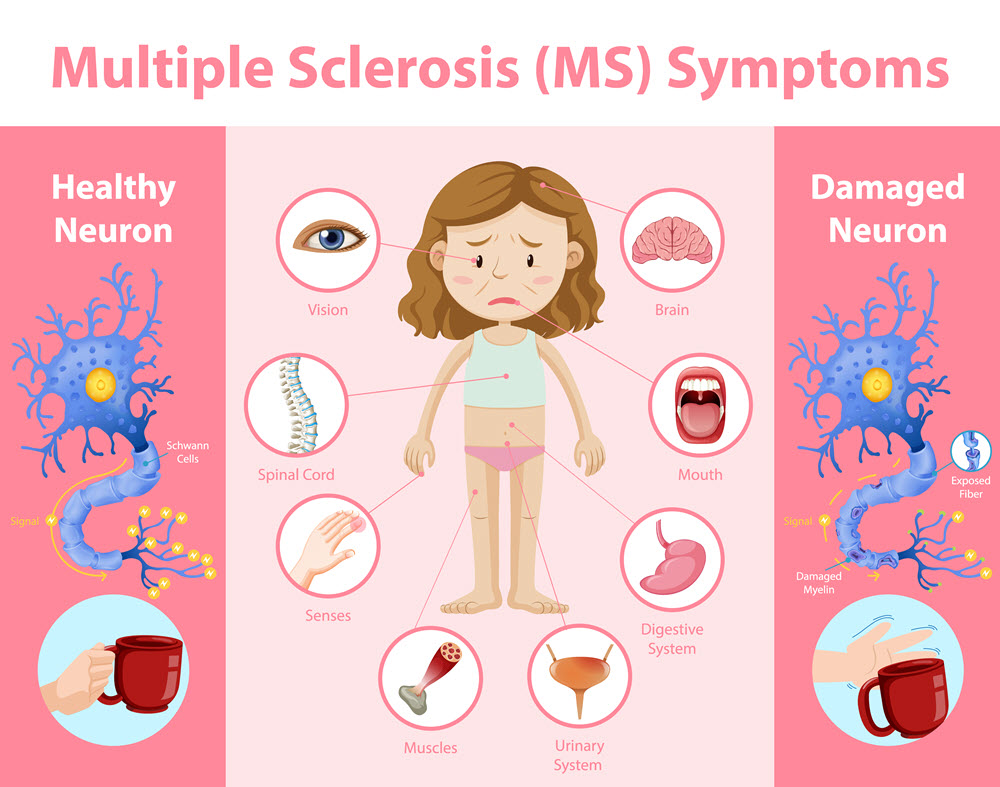Allergies & Immunology
Multiple Sclerosis (MS): Things You Need to Know
By S.I. (staff writer) , published on August 31, 2021

Medicine Telehealth Health autoimmune neurons
What is Multiple Sclerosis (MS)?
Multiple Sclerosis (MS) is a chronic disease of the central nervous system (CNS). It is an autoimmune disease in which your immune system attacks the protective sheath, called ‘myelin sheath’ around the neurons [1]. It results in inflammation and the formation of temporary lesions on neurons. These lesions disrupt the communication between CNS and the body.
Myelin sheath insulates and protects the neuron from damage and makes the signals run faster. Damage to the sheath either makes the signals slow or completely blocks them.
What are the Symptoms of MS?
Following are some common symptoms associated with multiple sclerosis [2]:
- Fatigue
- Difficulty in walking
- Numbness and weakness of the limbs
- Muscle spasticity
- Difficulty in keeping balance
- Tremors
- Electric shock-like sensations across the body
- Double vision
- Blurred vision
- Slurred speech
- Partial or complete loss of vision
- Involuntary movement of the eyes
- Vertigo
- Urinary incontinence
- Disrupted sexual function
- Acute or chronic pain
What are the Causes and Risk Factors of MS?
It is an autoimmune disorder that can be triggered by environmental factors. It can be any virus, toxin, or other environmental factors. This disease runs in the families. You are more likely to have multiple sclerosis if your parents or siblings have it [3].
Antibodies attack the protective sheath and destroy it. A combination of family history and some environmental factors can explain its presence in certain people.
Following are some common risk factors for multiple sclerosis:
- Age
- Gender
- Family history
- Race
- Environmental factors
- Certain infections
- Climate
- Vitamin D deficiency
- Some autoimmune diseases
- Smoking
What are the Types of MS?
Following are the types of multiple sclerosis [4]:
- Clinically isolated syndrome (CIS)
- Primary progressive multiple sclerosis (PPMS)
- Secondary progressive multiple sclerosis (SPMS)
- Relapsing-remitting multiple sclerosis (RRMS)
What are the Treatment Options?
Unfortunately, currently, there is no cure for multiple sclerosis. However, several treatment options are available that can help manage symptoms and make your life better. Following are some common treatment options for multiple sclerosis [5]:
- Disease-modifying therapy (DMT): It involves medicines to slow the progression of the disease and prevent relapse.
Self-injectable disease-modifying medicines are used to control symptoms. These include beta interferons, monoclonal antibodies, and glatiramer acetate.
- Corticosteroids: methylprednisolone and prednisone are the most commonly prescribed steroid for preventing relapse. These drugs reduce inflammation of the neurons and improve impulse transmission. However, steroids are associated with a huge number of side effects.
- Plasma exchange: also known as plasmapheresis, this procedure involves removing the fluid part of the blood (plasma) from cellular components. Isolated blood cells are mixed with an albumin protein solution and put back into your body. Plasmapheresis helps relieve symptoms of MS if they are new and do not respond to steroid therapy.
Apart from these treatment options, symptomatic treatment is given for pain relief, muscle spasms, fatigue, etc. Physical therapy can help with mobility and limb weakness issues.
References:
- https://www.ncbi.nlm.nih.gov/books/NBK499849/
- https://www.ncbi.nlm.nih.gov/pmc/articles/PMC7348625/
- https://www.ncbi.nlm.nih.gov/pmc/articles/PMC5241505/#:~:text=Environmental%20factors%2C%20including%20exposure%20to,with%20the%20onset%20of%20MS.
- https://www.ncbi.nlm.nih.gov/pmc/articles/PMC5241505/#:~:text=Subtypes%20of%20MS%20are%20considered,progressive%20relapsing%20MS%20(PRMS).
- https://www.ncbi.nlm.nih.gov/pmc/articles/PMC5532591/
Find articles related to: Medicine Telehealth Health autoimmune neurons
More articles about Allergies & Immunology
Back to the Health Tips Index




